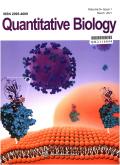血浆蛋白质组图谱揭示晚期结直肠癌患者化疗耐药性的生物标志物
IF 0.6
4区 生物学
Q4 MATHEMATICAL & COMPUTATIONAL BIOLOGY
引用次数: 0
摘要
结肠直肠癌(CRC)是最常见的癌症之一。晚期 CRC 患者只能依靠化疗来改善预后。然而,原发性耐药性经常发生,而且难以预测。血浆蛋白成分的变化已显示出临床诊断的潜力。因此,当务之急是确定 CRC 患者对化疗产生原发性耐药性的潜在蛋白质生物标志物。研究人员利用自动样本制备和高通量分析技术探索潜在的血浆蛋白生物标志物。研究了循环肿瘤细胞(CTCs)的药物敏感性测试,并讨论了其数值与蛋白质表达之间的关系。此外,还分析了不同化疗结果中的差异蛋白。最后,通过酶联免疫吸附试验(ELISA)检测了潜在的生物标记物。对 60 名 CRC 患者的血浆蛋白质组进行了分析。血浆蛋白水平与 CTCs 药物敏感性检测结果之间存在相关性,其中 85 种蛋白与化疗耐药性呈显著的正相关或负相关。然后根据化疗结果(客观反应、疾病稳定和疾病进展)将 44 名 CRC 患者分为三组,发现 37 种差异蛋白与化疗耐药性有关。使用酶联免疫吸附法对另外一组 79 例患者中的重叠蛋白进行了进一步研究。与其他结果组相比,进展期疾病组的 F5 和 PROZ 蛋白水平明显升高。我们的研究表明,F5和PROZ蛋白可能是晚期CRC患者化疗耐药性的潜在生物标志物。本文章由计算机程序翻译,如有差异,请以英文原文为准。
Plasma proteome profiling reveals biomarkers of chemotherapy resistance in patients with advanced colorectal cancer
Colorectal cancer (CRC) is one of the most common cancers. Patients with advanced CRC can only rely on chemotherapy to improve outcomes. However, primary drug resistance frequently occurs and is difficult to predict. Changes in plasma protein composition have shown potential in clinical diagnosis. Thus, it is urgent to identify potential protein biomarkers for primary resistance to chemotherapy for patients with CRC. Automatic sample preparation and high‐throughput analysis were used to explore potential plasma protein biomarkers. Drug susceptibility testing of circulating tumor cells (CTCs) has been investigated, and the relationship between their values and protein expressions has been discussed. In addition, the differential proteins in different chemotherapy outcomes have been analyzed. Finally, the potential biomarkers have been detected via enzyme‐linked immunosorbent assay (ELISA). Plasma proteome of 60 CRC patients were profiled. The correlation between plasma protein levels and the results of drug susceptibility testing of CTCs was performed, and 85 proteins showed a significant positive or negative correlation with chemotherapy resistance. Forty‐four CRC patients were then divided into three groups according to their chemotherapy outcomes (objective response, stable disease, and progressive disease), and 37 differential proteins were found to be related to chemotherapy resistance. The overlapping proteins were further investigated in an additional group of 79 patients using ELISA. Protein levels of F5 and PROZ significantly increased in the progressive disease group compared to other outcome groups. Our study indicated that F5 and PROZ proteins could represent potential biomarkers of resistance to chemotherapy in advanced CRC patients.
求助全文
通过发布文献求助,成功后即可免费获取论文全文。
去求助
来源期刊

Quantitative Biology
MATHEMATICAL & COMPUTATIONAL BIOLOGY-
CiteScore
5.00
自引率
3.20%
发文量
264
期刊介绍:
Quantitative Biology is an interdisciplinary journal that focuses on original research that uses quantitative approaches and technologies to analyze and integrate biological systems, construct and model engineered life systems, and gain a deeper understanding of the life sciences. It aims to provide a platform for not only the analysis but also the integration and construction of biological systems. It is a quarterly journal seeking to provide an inter- and multi-disciplinary forum for a broad blend of peer-reviewed academic papers in order to promote rapid communication and exchange between scientists in the East and the West. The content of Quantitative Biology will mainly focus on the two broad and related areas: ·bioinformatics and computational biology, which focuses on dealing with information technologies and computational methodologies that can efficiently and accurately manipulate –omics data and transform molecular information into biological knowledge. ·systems and synthetic biology, which focuses on complex interactions in biological systems and the emergent functional properties, and on the design and construction of new biological functions and systems. Its goal is to reflect the significant advances made in quantitatively investigating and modeling both natural and engineered life systems at the molecular and higher levels. The journal particularly encourages original papers that link novel theory with cutting-edge experiments, especially in the newly emerging and multi-disciplinary areas of research. The journal also welcomes high-quality reviews and perspective articles.
 求助内容:
求助内容: 应助结果提醒方式:
应助结果提醒方式:


